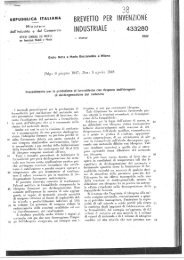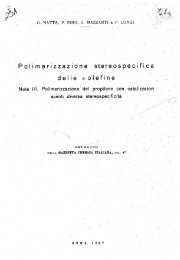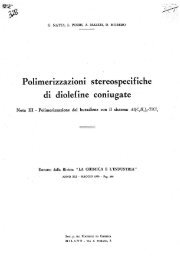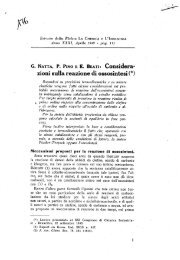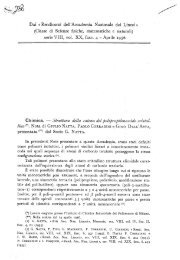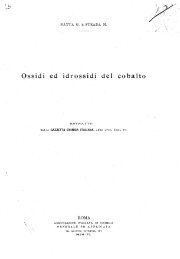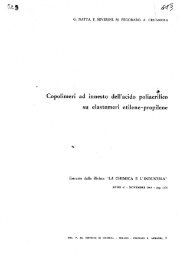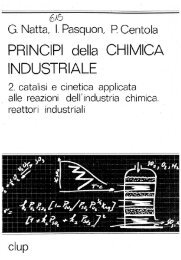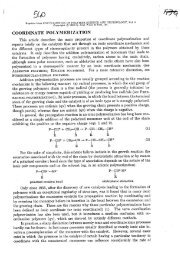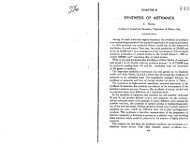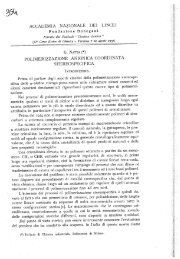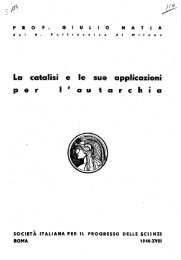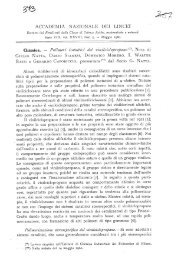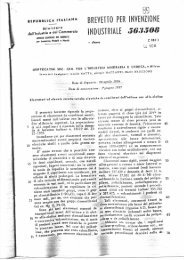n. 7, Ottobre 2003 - Giulio Natta
n. 7, Ottobre 2003 - Giulio Natta
n. 7, Ottobre 2003 - Giulio Natta
You also want an ePaper? Increase the reach of your titles
YUMPU automatically turns print PDFs into web optimized ePapers that Google loves.
Emilio Gatti<br />
<strong>Giulio</strong> <strong>Natta</strong><br />
nel Politecnico di Milano<br />
<strong>Giulio</strong> <strong>Natta</strong><br />
in the Politecnico di Milano<br />
<strong>Giulio</strong> <strong>Natta</strong> was a charismatic person who, in my<br />
opinion, represents the ideal model of the professor<br />
scientist in a polytechnic University.<br />
He was a theoretical and experimental academic of<br />
basic science, knew and used the most updated experimental<br />
means of analysis of the molecular structure<br />
of the matter (at the time, X ray and electron diffraction),<br />
and knew the synthetic macromolecules<br />
obtained by means of new processes of stereospecific<br />
catalysis he conceived.<br />
He was deeply an engineer in knowing the features<br />
of the materials appropriate to applications in every<br />
field of chemical, mechanical, structural and electrical<br />
engineering. He did not limit himself to laboratory<br />
synthesis or to the chemical and physical characterization<br />
of the macromolecular materials he<br />
obtained, but he designed pilot plants and assessed<br />
also the patent, legal and economic issues of industrial<br />
plants, with the involvement of enlightened<br />
industrialists who gave the Politecnico the resources<br />
to erect buildings and laboratories provided with the<br />
most sophisticated experimental equipment and to<br />
have appropriate human resources: professors,<br />
researchers, students following doctorate courses<br />
ahead of their time. Thus <strong>Natta</strong> created a permanent<br />
cultural environment of scientists that attracted<br />
researchers from the world over and produced<br />
applied chemical engineers for the Italian and world<br />
polymer industry. Results and plants connected to<br />
his patents were fundamental for the development of<br />
the production and use of new plastic materials provided<br />
with previously unimaginable properties.<br />
70<br />
<strong>Giulio</strong> <strong>Natta</strong> è stato una figura carismatica che<br />
secondo me rappresenta il modello ideale dello<br />
scienziato professore in un’università politecnica.<br />
È stato uno studioso teorico e sperimentale delle<br />
scienze di base, conoscitore e utilizzatore dei più<br />
recenti mezzi sperimentali di analisi della struttura<br />
molecolare della materia (al tempo diffrazione di<br />
raggi X e di elettroni), conoscitore delle macromolecole<br />
sintetiche ottenute con nuovi processi di catalisi<br />
stereospecifica da lui ideati.<br />
È stato profondamente ingegnere nel conoscere le<br />
caratteristiche dei materiali adatti alle applicazioni<br />
in ogni campo dell’ingegneria chimica, meccanica,<br />
strutturale, elettrica. Non si è limitato alle sintesi in<br />
laboratorio e alla caratterizzazione chimica e fisica<br />
dei materiali macromolecolari ottenuti, ma ha progettato<br />
impianti pilota e ha valutato per gli impianti<br />
industriali e anche gli aspetti brevettuali, legali ed<br />
economici coinvolgendo illuminati industriali che<br />
hanno dato le risorse al Politecnico per costruire<br />
edifici e laboratori muniti delle più moderne attrezzature<br />
sperimentali e di disporre di adeguate risorse<br />
umane: professori, ricercatori, dottorandi ante litteram.<br />
<strong>Natta</strong> ha così creato un permanente ambiente culturale<br />
di Scienziati che ha attratto ricercatori da tutto<br />
il mondo e ha prodotto ingegneri chimici applicati<br />
per l’industria dei polimeri italiana e mondiale. I<br />
risultati e gli impianti legati ai suoi brevetti sono<br />
stati determinanti per lo sviluppo della produzione<br />
e dell’impiego di nuovi materiali plastici dotati di<br />
proprietà prima impensabili.<br />
Io, elettronico, strumentista per le esperienze di fisica<br />
nucleare, non ho avuto l’occasione di lavorare<br />
con il grande Maestro <strong>Giulio</strong> <strong>Natta</strong>, ma l’ho conosciuto<br />
al Politecnico e in vacanza nella sua villa di<br />
Champoluc, apparentemente timido ma sempre disponibile<br />
al colloquio scientifico, umile nella sua<br />
grandezza.<br />
Il collega prof.Allegra mi ha pregato di scrivere queste<br />
righe, pensando che, come professore ex decano<br />
del Politecnico, potessi scrivere di quanto <strong>Natta</strong> ha<br />
dato al Politecnico.<br />
Io posso solo dire: un irraggiungibile esempio, le sue<br />
scoperte e la sua Scuola.<br />
Non oso dire di più perché <strong>Natta</strong> stesso ha detto<br />
tutto, con estrema chiarezza, nella prolusione che ha<br />
pronunciato in occasione dell’apertura dell’anno<br />
accademico 1957-1958 cdi seguito riportata.<br />
1.<br />
Immagine di <strong>Giulio</strong> <strong>Natta</strong>,<br />
prese nel 1963, alla vigilia<br />
del premio Nobel<br />
Photo of <strong>Giulio</strong> <strong>Natta</strong>,<br />
taken in 1963, on the eve<br />
of the Nobel Prize<br />
As an electronics engineer and instrumentation<br />
expert in nuclear physics, I did not have the chance<br />
to work with great Master <strong>Giulio</strong> <strong>Natta</strong>, but I knew<br />
him at the Politecnico and on holiday in his<br />
Champoluc house, apparently timid but always<br />
ready for scientific talks, humble in his greatness.<br />
My colleague, professor Allegra, asked me to write<br />
these lines, considering that, in my capacity of former<br />
senior professor at Politecnico, I would write<br />
about how much <strong>Natta</strong> gave to the Politecnico.<br />
<strong>Natta</strong> represented an unreachable example, for his<br />
discoveries and his School.<br />
I do not dare say more, because <strong>Natta</strong> himself said<br />
everything, with utter clarity, in the inaugural lecture<br />
he made on the occasion of the opening of the 1957-<br />
1958 academic year, which follows below.<br />
71



